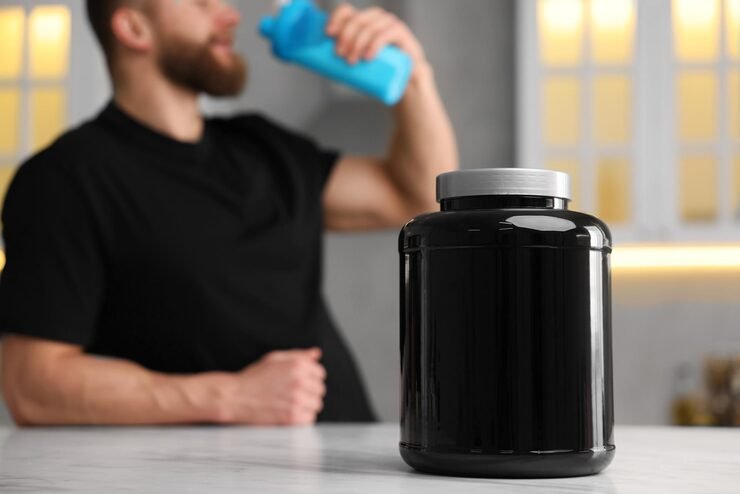You hit the gym, take your pre-workout, and suddenly wonder is it making me gain weight?
It’s one of the most common anxieties in fitness. You’re working hard, your muscles are burning, and your focus is sharp, only to see the number on the scale tick up a few days later. Panic sets in: Is this powerful powder sabotaging my weight goals?
Pre-workout supplements are immensely popular because they deliver on their promise: to boost energy, focus, and endurance so you can crush your session. But when it comes to the scale, the answer to does pre-workout make you gain weight is not a simple yes or no. It depends on the ingredients, how you use it, and what you’re eating the rest of the day.
We’re going to pull back the curtain and show you exactly what’s happening to your body and how to separate water, muscle, and actual fat.

What Is a Pre-Workout Supplement?
Before addressing the weight question, it helps to understand what you’re actually consuming.
A pre-workout is a multi-ingredient dietary supplement, typically a powdered mix, designed to be taken about 20-30 minutes before exercise. Its primary purpose is to boost performance by providing a synergistic mix of energy-enhancing compounds.
The Purpose (Pre-Workout Benefits):
- Energy: Kicks you into gear for your session.
- Focus: Helps you concentrate on your form and mind-muscle connection.
- Endurance: Allows you to squeeze out extra reps or push harder for longer.
Common Ingredients (How Pre-Workout Works):
Quality pre-workouts are built around several key active ingredients:
- Caffeine: A central nervous system stimulant for energy and focus.
- Creatine: An amino acid derivative that helps muscles produce energy during heavy lifting.
- Beta-Alanine: An amino acid that reduces muscle fatigue, causing the temporary tingling sensation.
- L-Citrulline: An amino acid that improves blood flow and gives you a better pump.
- Amino Acids (BCAAs): Building blocks for muscle repair.
Must Read This : How Much Pre-Workout Should You Take?
Can Pre-Workout Cause Weight Gain?
Let’s get straight to the point: Technically, pre-workout does not make you gain fat but it can cause temporary and desirable weight changes on the scale.
The confusion arises because the scale measures total body weight, which includes everything from bone and muscle to food in your stomach and, most relevantly, water.
That extra 1–2 pounds you see after starting a new pre-workout might just be water, not fat. Understanding the difference between these types of pre-workout and weight gain is crucial for maintaining a healthy mindset.
Why You Might See Weight Gain After Taking Pre-Workout
If your pre-workout isn’t causing fat, why is the scale moving? The cause is almost always one of these four factors:
a. Water Retention from Creatine
This is the most common reason for a sudden scale spike. Creatine is a powerful supplement that helps your muscles work harder, but it requires water to function. When your muscles absorb creatine, they actively pull water into the muscle cells. This “intracellular hydration” is highly beneficial for performance and muscle volume but will register as weight gain on the scale.
b. Added Sugars or Hidden Carbs
Some pre-workouts prioritize taste over health and are loaded with sugar or high-calorie carbohydrate fillers. If your scoop contains $10g$ or more of carbohydrates, those extra calories can definitely add up over time, leading to genuine fat gain if you are not tracking your total daily intake.
c. Increased Appetite
For some individuals, the stimulating effects of high caffeine or the intense, metabolism-boosting workout itself can lead to increased hunger signals. If you use your intense workout as an excuse to overeat, the resulting caloric surplus not the pre-workout is causing the gain.
d. Muscle Growth
The goal of using a pre-workout is to push yourself harder. If it’s working, you will build muscle faster. Muscle tissue is denser than fat. Seeing a slow, consistent weight gain over several weeks or months, coupled with increases in strength and firmness, is a sign that your investment is paying off!
Does Pre-Workout Make You Gain Fat?
No. End of story.
The fundamental law of weight management is the Calorie Deficit Principle.
Fat Gain only happens when you are in a persistent, long-term caloric surplus that is, you consistently eat more calories than your body burns through all activity and basic life functions.
Most pre-workout supplements are extremely low in calories (often $0$ to $20$ per serving). They cannot, by themselves, create a large enough caloric surplus to cause meaningful fat gain.
If you are concerned about pre-workout and fat gain, you must look at your overall nutrition, not the supplement. It’s not the supplement, it’s your nutrition and habits. If you are managing your diet and still getting great workouts, pre-workout is absolutely fine for weight loss.
How to Choose the Right Pre-Workout to Avoid Weight Gain
For those focused on weight loss, a good best pre-workout for weight loss is one that is clean and free of caloric surprises.
- Check Nutrition Labels: This is non-negotiable. Look for $0$ sugar and low-calorie pre-workout options. The best brands clearly list the amount of every ingredient.
- Avoid Proprietary Blends: If the label lists a proprietary blend without specific ingredient amounts, you have no idea how much sugar or filler is inside. Avoid them.
- Opt for Stimulant-Free Options: If you are sensitive to caffeine (which can sometimes increase appetite), try a non-stimulant formula that focuses on nitric oxide boosters (like Citrulline) and endurance enhancers (like Beta-Alanine).

How to Use Pre-Workout Safely and Effectively
A pre-workout is a tool; it should not be a crutch.
- Ideal Dosage and Timing: Take one serving mixed with water $20$ to $30$ minutes before your exercise. This gives the body time to absorb the stimulants and active ingredients.
- Don’t Over-Rely on It: You should not take pre-workout daily. Your body needs rest from stimulants and your adrenal system needs a break. Use it strategically on your most intense days (heavy lift days, long cardio sessions) and skip it on light days.
- An Empathetic Note: It’s okay to skip it some days your body knows how to move on its own too. Relying on it every day builds tolerance and diminishes its effects.
Common Myths About Pre-Workout and Weight Gain (Busted)
| Myth | The Reality |
| Pre-workout makes you fat. | False. Pre-workout is too low-calorie to cause fat gain. Excess calories in your diet cause fat gain. |
| Pre-workout bloating = fat gain. | Temporary Water Retention. This is usually due to creatine drawing water into the muscles or minor digestive issues from sweeteners. It is not fat. |
| More pre-workout = better results. | Not True. Exceeding the recommended dosage can lead to anxiety, jitters, high heart rate, and increased stress hormones (cortisol), which can actually hinder long-term progress. |
When to Talk to a Nutritionist or Trainer
While this guide covers the general rules, your body is unique. Consider seeking professional advice if you notice:
- Consistent Unexplained Weight Gain: If you are confident your diet is clean (caloric deficit) but the scale keeps rising after the water weight phase, a professional can check for other hormonal or metabolic causes.
- Digestive Issues or Side Effects: Persistent nausea, stomach cramps, or sleeplessness from your pre-workout mean it’s time to adjust the dose or switch formulas.
Conclusion
When you ask, Does pre-workout make you gain weight? the key takeaway is that the scale fluctuation is a normal, non-fat result of the supplement doing its job.
Pre-workout is designed to enhance your performance, which ultimately helps you achieve your body composition goals faster. The momentary water retention is a tiny price to pay for superior performance in the gym.
Encourage balance: pair your pre-workout with clean eating and regular exercise.
Pre-workout is a tool, not a trap use it wisely, stay consistent, and let your hard work show on and off the scale.
Frequently Asked Questions (FAQs)
1. Does pre-workout make you gain weight?
Not in terms of fat! Pre-workout may cause temporary weight gain due to water retention or muscle growth, especially if it contains creatine. This isn’t body fat it’s your muscles holding extra water to perform better during workouts.
2. Can pre-workout supplements make you fat?
No, pre-workout doesn’t directly cause fat gain. Fat gain only happens if you eat more calories than your body burns. Most pre-workouts are low in calories, so they won’t make you fat unless your overall diet leads to a calorie surplus.
3. Why do I feel bloated after taking pre-workout?
Some ingredients like creatine, sodium, or artificial sweeteners can cause mild bloating or water retention. It’s temporary and usually goes away once your body adjusts. To minimize bloating, drink plenty of water and choose cleaner formulas with fewer additives.
4. Is it okay to take pre-workout every day?
It’s generally safe, but not always necessary. Using pre-workout every day can make your body dependent on caffeine for energy. Try cycling off every few weeks or use it only on intense training days to keep your natural energy balanced.
5. Does pre-workout make you gain muscle?
Indirectly, yes. Pre-workout helps you train harder and lift heavier, which leads to muscle growth over time. However, it doesn’t build muscle on its own you still need proper training and nutrition to see results.



